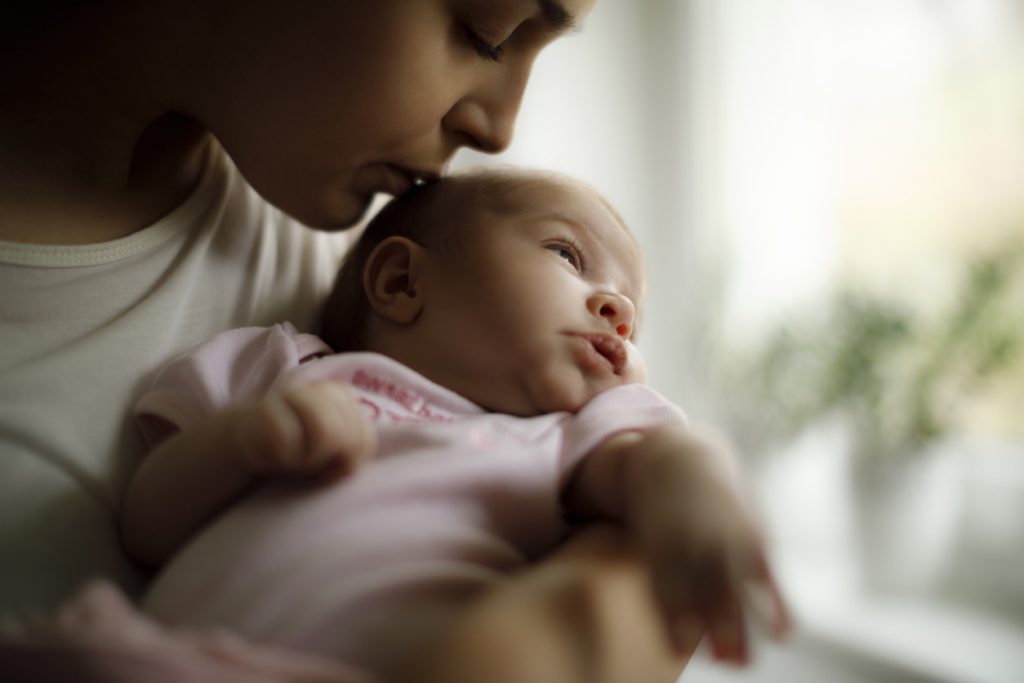Would I Spend $20,000 For A Drug To Treat Postpartum Depression? Hell, Yeah!

Would you shell out between $20,000 to $34,000 (USD) to make sure you didn’t suffer from postpartum depression? I would. Without blinking an eye.
I was beyond thrilled when I read that there’s finally – FINALLY! – a drug specifically for postpartum depression. For the first time in history, last week, the US Food and Drug Administration, announced the approval of an intravenous infusion of the drug brexanolone, (which will be sold as Zelresso) set to hit the market, as early as late June. This new intravenous drug has been shown in clinical trials to work within hours to treat the symptoms of postpartum depression, which affects about one in seven women.
As Tiffany Farchione, the acting director of the Division of Psychiatry Products in the FDA’s Center for Drug Evaluation and Research, says, “Postpartum depression is a serious condition that, when severe, can be life-threatening. Women may experience thoughts about harming themselves or harming their child.”
When I had my first born, I suffered greatly from postpartum depression. It didn’t hit me immediately, but then one day, about six weeks after my daughter was born, I found myself crying hysterically, for no apparent reason. I also was spending a lot of time in bed, not because I was recovering from a C-section, but because when I slept, I didn’t have thoughts like, “Well, I don’t want to kill myself. But if I just didn’t wake up, that would be okay…” Or, “If I just didn’t look before I crossed the street…”
I called my daughter’s father at the office, bawling uncontrollably, and said, “I think I need to see a doctor. I don’t know what’s wrong with me. I can’t stop crying.” I didn’t mention to him the other thoughts that were racing through my brain like, “I hate my life.” And, “What would happen if I just…disappeared?” Oh, how to describe postpartum depression? At best, I can describe it as a paralyzing sadness.
My then-partner called the doctor and told me the doctor could see me in two hours. “I can’t wait two hours!,” I bawled. “I need to go NOW.” And so the father of my firstborn drove me, pyjama-clad, to the doctor’s office, where my tears and hyperventilating sobs tuned the heads of the other patients. No one wants a hysterically crying woman, in ratty pyjamas who also hadn’t showered in days, in a waiting room. The doctor saw me immediately.
“Anything new in your life?” he asked when I told him I was so depressed and didn’t know why. I had a beautiful, healthy baby girl; a girl that I so desperately wanted!
Clearly, he had no idea about postpartum depression, and this, as recently as 15 years ago! He prescribed me an anti-depressant that I took, even though I wasn’t convinced it worked. But I wasn’t sure if it didn’t work either. Eventually, after many, many weeks, I could see some sunshine through the dark clouds. Was it time, or was it the drugs? I’ll never know.
I truly don’t think my brain has ever fully recovered from having postpartum depression, or the trauma of having suffered through it. It’s worth remembering that antidepressants can take weeks to work, and they don’t always help women with PPD. The fact that this new drug works fast, and seems to “reduce the severity of women’s symptoms in every trial, is notable.”
So, yeah, even though many women take into account their postpartum depression after their first baby when they are thinking of having a second, I knew that I wanted another baby. But I would be SMART! I would PREPARE, not just for this baby, but for possible postpartum depression.
This new drug requires time and money from new mothers. The drug will likely be priced around $20,000 to $35,000 per treatment/person, Sage Therapeutics, the company that developed the drug, confirmed. “The number of vials used before discounts can vary from patient to patient. The treatment is administered as a single 60-hour IV drip and was found to have mild side effects, such as headache, dizziness or excessive sleepiness, but also a sudden loss of consciousness.”
So why would I have no issue paying for this, and would save every cent so I could pay for the drug, no matter what? Because, as a PPD survivor, it’s fucking worth it! Plus, I had probably spent almost that much in preparation for the birth of my second child, knowing that there was a high probability I would suffer again, because those who have experienced PPD have a greater chance of experiencing it again.
Yes, I spent around $12,000 for night nurses to take care of my baby while I got to sleep throughout the night during those first few weeks. Exhaustion is not good for people prone to depression, so I made sure that I got a lot of sleep, hiring night nurses to watch and feed my baby. Before my beautiful son was born, I set up therapy appointments – at $250 a pop – leading up to giving birth and also for after his birth, so I had someone to talk to. I started taking anti-depressants immediately after his birth (and I have no health coverage.) I also hired a live-in nanny, spending thousands of dollars to sponsor her. I had to re-do the forms, after making one tiny mistake, and hire an immigration lawyer, to help sponsor this live-in nanny I so adored.
All told, I spent probably about $8,000 trying to get this wonderful nanny sponsored. Not only did I pay her salary, but I also started paying around $5000 a year, for a private doctor, one I could reach 24/7 by text, with questions or concerns about my health, both physically and mentally.
I actively prepared for the possibility of suffering though postpartum depression again, and, in total, I definitely spent more than $20,000 anyway to make sure I wouldn’t be hit with thoughts of me not wanting to wake up, yet again.
If it sounds like this is a solution just for the rich, I agree that it’s most definitely cost-prohibitive and may be too prohibitive to reach the moms who’d benefit most. But, I would have spent it, because I would have benefited from it.
The second I found out I was pregnant with baby number two, I started saving hard. I didn’t go out to eat. I started shopping at cheap grocery stores. I made my own coffee at home. I didn’t buy any new purses, clothes, handbags. I travelled less. I cancelled my personal trainer. I stopped getting regular manicures. I stopped going to the hairdresser. Every cent I earned went directly into my own, personal, “DO NOT GET POSTPARTUM” GoFund me account, one I had set up, especially for possible postpartum depression.
Brexanolone was tested in women with moderate to severe postpartum depression in multiple clinical trials. “And it appears to take days, not weeks, to work.” Women experienced a “significant and clinically meaningful” reduction in their depression, meaning they went from “reporting feeling severely depressed to feeling normal.” To me, this is amazing!
These studies only followed these women for a month. So there’s the question of what happens to women’s lives later, which is part of the reason the FDA only approved the drug on a “restricted access program, meaning moms can’t just get a prescription from anyone and take it at home. Instead, they have to go to a health care provider in a clinic that’s been certified to deliver brexanolone, and they need to stay in the clinic for two and a half days while the drug is administered through a continuous IV infusion.”
Meh, to me, feeling “normal” far outweighs the side affects and 60-hour continuous IV.
It’s not just that not only had I already spent almost so much anyway in preparation for the possible postpartum depression striking again, when I was on my second pregnancy. The fact is – even after spending all that money, on night nurses, on therapists, on anti-depressants, on vacations – none of my preparation worked! That’s right. Even after all that money, I still ended up with postpartum depression.
But at least I knew the symptoms and could advocate for myself and also warn my partner what I was going through by sending him articles on postpartum depression. When I reflect on it, I think one of the reasons that it didn’t work out with my daughter’s father is partly because postpartum depression played a role in the demise of our relationship. I would say the same thing about the demise of my relationship with my son’s father too. So, hell yeah, I would spend between $20,000 to $34,000, for a drug like this.
Only those who have suffered from postpartum depression know that you can’t put a price or, rather, you’d spend anything, to stop the suffering, or to avoid going through it again. Am I right?















